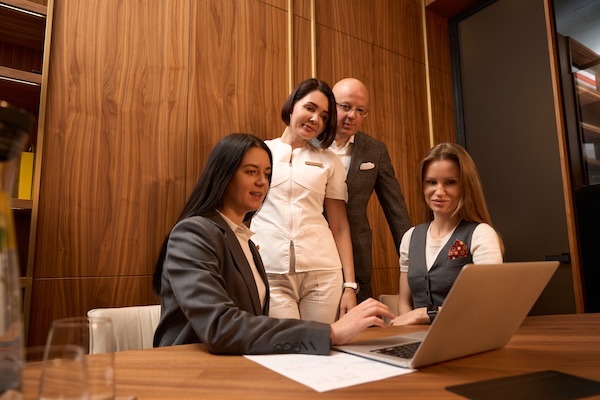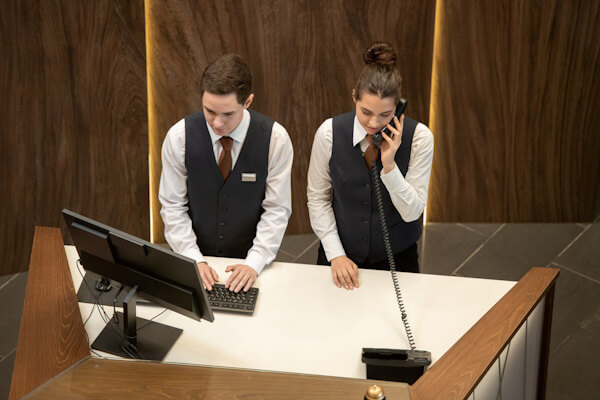10 Insights From Cornell’s Industry Recovery Webinar
10 Insights From Cornell’s Industry Recovery Webinar
This week, Dr. Kate Walsh, Dean, The Hotel School, Cornell SC Johnson College of Business moderated a webinar with three industry experts to discuss the current state of the hospitality industry and what the future might look like. Her guests were Chip Rogers, President and CEO of AHLA, Raymond Martz, Executive VP and CEO of Pebblebrook Hotel Trust and Roger Hill, Chairman and CEO of The Gettys Group. These are our top 10 takeaways.
1) It will be all about cleanliness
In order for people to feel safe traveling, the industry will need to have increased standards around cleaning and safety. As a result, the AHLA introduced ‘Safe Stay’ standards that set a minimum guideline for hotels to follow. According to the press release, issued Monday, the standards “were developed under the guidance of an industry advisory council in conjunction with public health experts and recommendations from the U.S. Centers for Disease Control and Prevention.” The largest 16 brands have adopted the standards and Chip urges the entire industry to abide and use Safe Stay as a way to bring guests back.
2) Don’t assume you know what guests want
While many of us have predicted that guests will likely not want housekeeping to enter the room during the stay, Martz shared that many guests of his Florida property surprised him by saying that they did, in fact, want their rooms cleaned. It’s a great reminder to engage with guests now and ask them what they want versus assuming you know what they want. Guests might be craving high service experiences after months of being inside and now isn’t the time to cut back. Let them be your guide in determining services and amenities.
3) Drive-to markets and resorts will recover first
The experts agree that there is pent-up travel demand and leisure will recover first. Because the entire supply chain is affected by the pandemic, people will feel safest by driving to their destination version taking a cab or uber to the airport, flying, then taking a cab or uber to their final destination. Chip also predicts that people will look for hotels with access to outdoor space. He says that while it’s not scientifically proven to be safer, many people feel safer outside, as evidenced by the California and Florida beaches when restrictions relaxed, so resorts with open space will be attractive to early travelers.
4) Technology can aid in recovery
The experts discussed how keyless check-in, digital food menus and safe elevator programming, among other innovations, could allow guests to feel safe when on-property by eliminating contact. Hotels need to be nimble and open to change but much of the technology they need is already available today.
5) Lack of cleaning standards for Airbnb presents an opportunity for hotels
Chip suggested that short term rentals will have problems if they don’t adopt uniform standards for cleaning, similar to Safe Stay. (On a recent Skift webinar, Airbnb CEO Chesky did allude to new standards, although it will be far more difficult to enforce since there are millions of hosts and each property is different.) This presents an opportunity for hotels to market themselves as safe and clean and win back business from short term rental sites.
6) Rapid testing could help conferences come back
The experts discussed a scenario where conference attendees could be asked to show up early to take a rapid health test prior to being admitted to the event. They also discussed using CLEAR to establish that attendees are healthy. While everyone is wrestling with the associated privacy concerns, it’s clear that changes will need to happen to support large gatherings in the future.
7) Tax measures could help
The AHLA is working on behalf of hoteliers to ensure they can come back strong from the pandemic since, in many cases, hotels were told to cease operations. He suggests that tax credits should be given to businesses who provide staff with masks and gloves. They should also be provided for hotels to invest in technology to make their facilities safer. It will allow hotels to invest in new solutions during a time that many are cash-strapped.
8) Hotels should reimagine their real estate
Less than a decade ago, hotels were focusing on creating more areas for people to come together and congregate. Driven by millennials’ affinity for co-working, travelers were spending less time in their rooms and more time in lobbies and public spaces. Now, we’re likely to see people returning to their rooms. Roger suggests that hotels rethink their spaces and look at selling meeting rooms to leisure guests who might want the bigger space to congregate when traveling with friends/family.
9) Don’t forget about staff safety
Hotels need to protect their staff. As we’re seeing from grocery workers today, employees will be hesitant to come back to their jobs if they don’t feel safe. Employers need to make sure that employees have PPE and know that if they don’t feel well, they need to stay home and will be supported.
10) No one really knows what’s going to happen
Ray reminded us that eight weeks ago the industry was looking pretty good. Today many hotels are at risk of shutting their doors forever or opening their doors under bank ownership. Things can change on a dime and hotels must be prepared for a whole new way of operating. They must be creative and re-envision the future of hospitality.
If you’re looking for more predictions around recovery, see what our customers think the future will look like.
This site is protected by reCAPTCHA and the Google Privacy Policy and Terms of Service apply. View our Terms & Conditions here. *Required fields.



